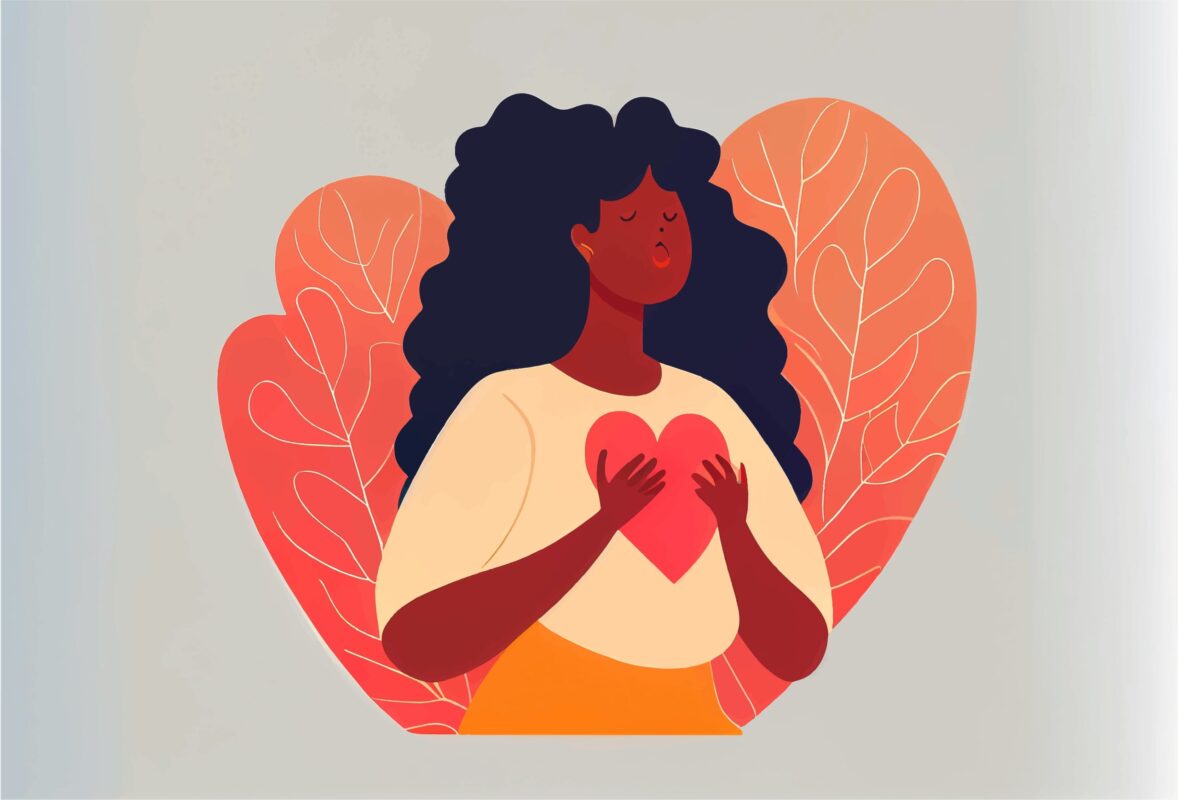No products in the cart.
Motivation
How I Went from Approval Seeking to Authentic Living

“My life transformed when I stopped caring what people in the stands thought.” ~Brené Brown
One afternoon, I had coffee with a friend who told me that she and her family all have a garden campfire every Friday night and toast marshmallows. It sounded so rustically idyllic compared to our normal frozen pizza and movie tradition that I asked my husband if we could do the same that evening.
He sat down to pick up the remote control and casually replied that he was too tired to build a fire, then thought nothing more of it. But I felt devastated and stormed out for my evening run.
As I pounded the pavement, the ranting in my head about my selfish husband grew, and so did my anger. As I prepared to return home, full of rage, I became aware of the suffering I was creating in myself and realized I was sick of feeling resentful toward my husband when we weren’t doing what I thought we “should” do.
When I walked through the door, rather than give my husband the silent treatment, I decided to sit and reflect on my anger. At the time, I was a trainee therapist, and I remember being told that anger was a secondary emotion.
So I asked myself, “What’s underneath my anger?” “Fear” was my response. I enquired further, “What am I scared of?” I knew my husband loved me, so it wasn’t about that, and then it hit me. I was scared of disapproval from others. My anger toward my husband was related to my need for approval from everyone else.
Something about his refusal to light that fire made me worry that people would think we were boring. Particularly my friend!
But why did I need approval so much? The awareness was like waking from a trance….I had zero self-worth.
I realized that my lack of self-worth and need for approval had impacted my entire life, with extreme consequences.
For example, I’d ditched nice friends for the cool ones at school only to be bullied by the “cool” ones later on. I pretended I liked certain music and nights out to get boys to like me in my teens, only to end up alone anyway. I spent my twenties and thirties never knowing who I was, always adapting my opinions and lifestyle (even what to wear and eat) depending on who I was with at the time.
The self-criticism never went away, and my inability to be myself left me isolated and struggling with depression. Meditation and exercise have all been useful in improving my mental health, but before that experience with my husband, I’d never been able to shake the feeling of not being good enough.
As I had just entered my forties, I was determined things would be different. I embarked on my own “self-worth boot camp.”
Before I explain the steps I took to improve self-worth and stop seeking approval, it’s helpful to be aware that we all need approval to some degree, as we are evolutionarily designed to seek it.
In prehistoric times, we relied on being accepted by our tribe for survival, so we have a part of the brain that scans for how we are perceived in the eyes of others. The problem is that if we also struggle with low self-worth, usually due to experiences in childhood, that need to fit in with others takes over and prevents us from knowing ourselves. Until we do the work to get past this, we will lead inauthentic lives and be prone to depression and anxiety.
Excessive approval seeking is a survival skill you have learned as a means to cope with feeling (not being!) unlovable. Unraveling this means building your self-worth and loving yourself.
Taking The First Step: Radically Accept Yourself
My journey to self-worth started with the acknowledgment that constantly putting myself down and changing myself to feel loved hadn’t worked so far. I never felt good enough, as it was a slippery pole I couldn’t get to the top of.
Something radical was needed, and the phrase “radical acceptance” popped into my head. I thought I had come up with that phrase all by myself, but I later discovered it’s the title of an amazing book on self-compassion by Tara Brach. (I like to think I channeled it through collective consciousness, but I probably just noticed it in my local bookstore and forgot.)
However, my take on radical acceptance at that time (which is slightly different to the book) was no matter what I was doing, thinking, wearing, being, etc.…I 100% accepted myself.
If I found myself scrolling social media comparing myself to friends and thinking I should have done more with my weekend, I paused and said, “It doesn’t matter…I’m still good enough.”
If I caught myself analyzing social interactions, wondering how I came across, I paused and said, “I don’t care what people think…I’m loveable.”
If I got upset that a friend had not texted back or I felt excluded from the different cliques in mummy land, I would take a deep breath and say, “It’s okay…you are loveable.”
Change Your Feelings: Loving Kindness Meditation for Self-Worth
Obviously, deciding to radically accept yourself is easier said than done, so I supplemented this mindset shift by a powerful self-loving meditation. This was a game changer and made a big difference to how I felt about myself.
Loving-kindness meditation is an ancient Buddhist practice that involves cultivating well-wishing toward people (including yourself) with certain thoughts and phrases (i.e., “may you be well, happy, and free of suffering”). First you say it to yourself, then a close friend, a stranger, and an enemy before finally expanding the sentiment to the rest of the world.
I’d dabbled in this before but felt something more intense was needed for my self-worth boot camp.
I first thought of someone I truly loved, and my kids came to mind. I thought of how much I loved them; that they weren’t perfect, but I knew they were loveable. But crucially, I also made an effort to connect to the effect these thoughts and feelings had in my body.
My body felt warm, pleasant, and tingly as I mentally offered this unconditional love to them.
Still holding on to the physical sensations of unconditional love in my body, I replaced this with a vision of myself. I reminded myself that I, too, was imperfect but worthy of love. I felt love toward myself and told myself that I was okay, doing the best I could, and was good enough as I was. I even told myself I loved myself.
I made sure I practiced this every day, and after about three to four weeks I noticed an internal shift, and my need to please started to fall away.
Find Out Who You Are: What Would You Do If…
Another sign of low self-worth was my chronic indecisiveness and self-doubt. I felt on the fence about so many things. Was I into running or yoga? A vegan, vegetarian, or carnivore? Did I love museums or mountains? Whenever I tried to decide something, the white noise of “how would that come across?” clouded my judgment.
Trying to please people all your life means you’re already disconnected from how you feel about things, but then if each decision continues to be based on what others will think, that path gets well-trodden, leading to inauthenticity and unhappiness.
Being all things to all people got more stressful as I got older. For example, as a working mum with limited time, I stretched myself thin thinking I should also be a mum who home baked, did crafts, and planned perfect birthday parties. Nobody could be all those things but, God, did I try. This just increased my stress and irritability and, ironically, worsened my presence as a mum.
My new approach meant that when I found myself stuck in indecision or feeling overwhelmed, I paused and said, “What would I do if I already felt good enough?”
This led to so many breakthroughs as I let go of the things I thought I should do and did what I wanted and needed instead. Yes, I was interested in yoga, but as I loved running and meditation, I didn’t have time. I accepted I was rubbish at kiddy crafts and would rather take my kids up a hill instead. I also discovered, amongst other things, I loved time on my own, with early nights and herbal tea rather than hangovers and a big social circle.
I discovered myself, and it felt fantastic.
Letting Go and Being Courageous: Mindfulness and Self-Compassion
Moving toward new, authentic living involves letting go of what you think other people want and having the guts to be true to yourself. This is where mindfulness and self-compassion are your friends.
However, my self-imposed “self-worth” boot camp may not have been possible unless I’d already been practicing mindfulness and self-compassion for a while. In my early thirties, I fell in love with mindfulness and became a teacher after it helped me stop self-critical thoughts from spiraling into depression. But it hadn’t really changed how I felt about myself until I combined it with the steps above.
When I decided to radically accept myself, mindfulness helped me to pause and notice my automatic thoughts about other people’s (imagined!) opinions long enough to generate some alternatives. The self-compassion practices I’d gained as a mindfulness teacher helped me tune into and accept the uncomfortable feelings that came with fear of rejection and offer myself kindness instead.
To get started with mindfulness and self-compassion meditations, it’s important to remember you are not trying to clear your mind but rather increasing your ability to notice your thoughts and feelings arising with non-judgmental awareness.
If you have time for a daily practice, you may notice changes after a few weeks, and an app can help you stay on track. Self-compassion means reminding yourself that you cannot help how you feel while cultivating the courage to respond to your feelings differently. Look up Tara Brach and Kristen Neff for some self-compassion practices to try.
Self-Worth Is a Journey: How I Feel Now
Waking up to (what Tara Brach calls) the trance of unworthiness really has been life-changing for me. Ultimately, recognizing that only I can decide I am loveable was key, and then making an effort to believe that myself rather than seeking validation.
It’s always a work in progress and, although I noticed changes quickly, I continue to use the steps on a regular basis when I notice falling back into old habits.
About Rebecca Stambridge
Rebecca is a fully qualified therapist and experienced mindfulness teacher. She loves helping women let go of stress and feel good enough through mindful self-compassion techniques. Sign up to her newsletter here to more content on improving your self-worth including early bird access to her online courses. Check out her website to work with her now.
See a typo or inaccuracy? Please contact us so we can fix it!

